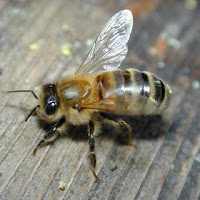 So many people tout the great benefits of eating local honey. You get the benefit of the bits and pieces of pollen and honey, which as an immune system booster is quite powerful. Allergy expert Tom Ogren's, and others’, mantra is “local is better.” When asked how local the honey should be for allergy prevention, he says, “I always advise to get honey that was raised closest to where you live, the closer the better since it will have more of exactly what you’ll need.”
So many people tout the great benefits of eating local honey. You get the benefit of the bits and pieces of pollen and honey, which as an immune system booster is quite powerful. Allergy expert Tom Ogren's, and others’, mantra is “local is better.” When asked how local the honey should be for allergy prevention, he says, “I always advise to get honey that was raised closest to where you live, the closer the better since it will have more of exactly what you’ll need.” With that in mind, I headed to the Farmers Market on a Saturday morning. A couple of stands had honey, which has to be local as the market features only local producers. I questioned one beekeeper on his honey as his label reads: Santa Barbara Honey. “Why would I buy Santa Barbara, California honey in Santa Fe?” I ask. He shares that he keeps bee hives on Santa Barbara Drive right off Old Pecos Trail in Santa Fe. That is less than a quarter of a mile from my house—my flowers helped in the making of this honey. My bees’ hard work is in those jars! When I walk along Old Pecos Trail, I can see the white bee hives in the grasses. I can’t get much closer than this.
There have been worries about the bee population and their colonies in the last two years. Hives have experienced colony collapse, an aberration where the hive dies off in very large numbers. Many theories have arisen—including cell towers interfering with their flights. To try to shed some light on it, I called Dr. Lawrence Connor, an entomologist, whose specialty is bees. He travels all over the world to meet with beekeepers and records their proceedings at international conferences. Sadly, he told me, bees seem to have a weakened immune system and research points to pesticides and pollution as culprits. A recent PBS show on this problem of bee die-off also cited a mite and a virus that has been identified in colonies which have hive collapse. No antidote has been found. The loss of the bee world would be a major blow to all crops as the bees are necessary for pollination—and our food supply.
Although I am allergic to bee stings, I can tell you I keep out of our bees' way and keep planting flowers for their benefit. They are after all, my neighbors, and good ones at that.
by PCH @ Main

1 comment:
Thanks for the nice little article Pat. We have bees, and sell our honey at the farmers markets near us. There is so much to learn about them. Lost several hives last year and another one this year, but gained one when a friend called us to come and get a swarm of bees from her back fence. Sally A.
Post a Comment